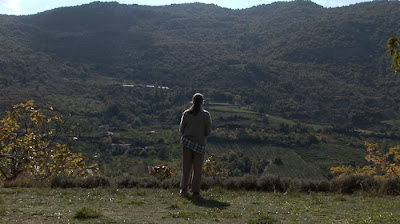I am in France with my sister for a week, working out how I might make some part of this film talk of her life. It is just the two of us in her beautiful house on the side of mountain in Provence.
She is in very good spirits and physically very well. Her short term memory is very bad but some things do still stick for a few hours and very important things remain for over a week.
Longer term memories come and go, usually they are quite blurry and mix into each other. Her childhood memories of being on a farm while evacuated from London during the war are the strongest and clearest.
She is living a very simple life with a routine in which she is very comfortable.
She sleeps very well, late until the sun has risen over the mountains at the end of the valley.
Breakfast takes a while. Toast and tea. Today we ate some Quince jam that we made together yesterday.
Then she might wander around in the garden collecting leaves to feed the neighbour's rabbits, knife in hand to pick flowers, and later take the rubbish down to the bin on the street at the corner of her garden.
Then after lunch she might spend several hours sewing the latest of her incredible patchwork quilts. This one she says will be huge.
Max, her white cat takes up much of her time demanding to be let in and out of doors (he prefers doors to windows) and asking for food.
During the day at some point if I wasnt here, one of the 3 ladies we have organised to visit her will come and either sit for a tea or take her for a drive or a walk, or to the market and a bar in town for lunch.
Now one of them is going to move into a little self-contained flat at one end of the house for the winter at least, after splitting with her husband and selling their house. So J will no longer be living alone which is great news.
So I come into this peaceful and ordered world with my camera and my ideas and it feels slightly ridiculous to bring it into the situation and point it in her direction, even though she doesn't object to what I am doing.
Meanwhile, I make as tasty meals as I can to give her a change from the slightly bland meals-on-wheels food they bring her. We go for walks and drives and have picnics on the side of mountains with chicken sandwiches. We sit and look at the view and listen to the wind and birds for ages at a time.
When we are together I try to be as calm and slow as possible. She is like a mirror; highly sensitive to my mood and behaviour.
We can talk about anything together, and she is often very funny and insightful as long as we stick to things in the immediate present. In general I don't try to talk about very complicated matters.
Its hard to know how this film might start or stop. Where it will begin, what a single scene will feel like. I suppose its because I am used to being able to build an image of a film as I think about in advance it but with this I dont know how it will be. Im probably used to being too controlling with my ideas and am keen to keep this one open ended. So on this trip I am pushing myself to take samples of different moments of the day without attempting to answer any big questions.






